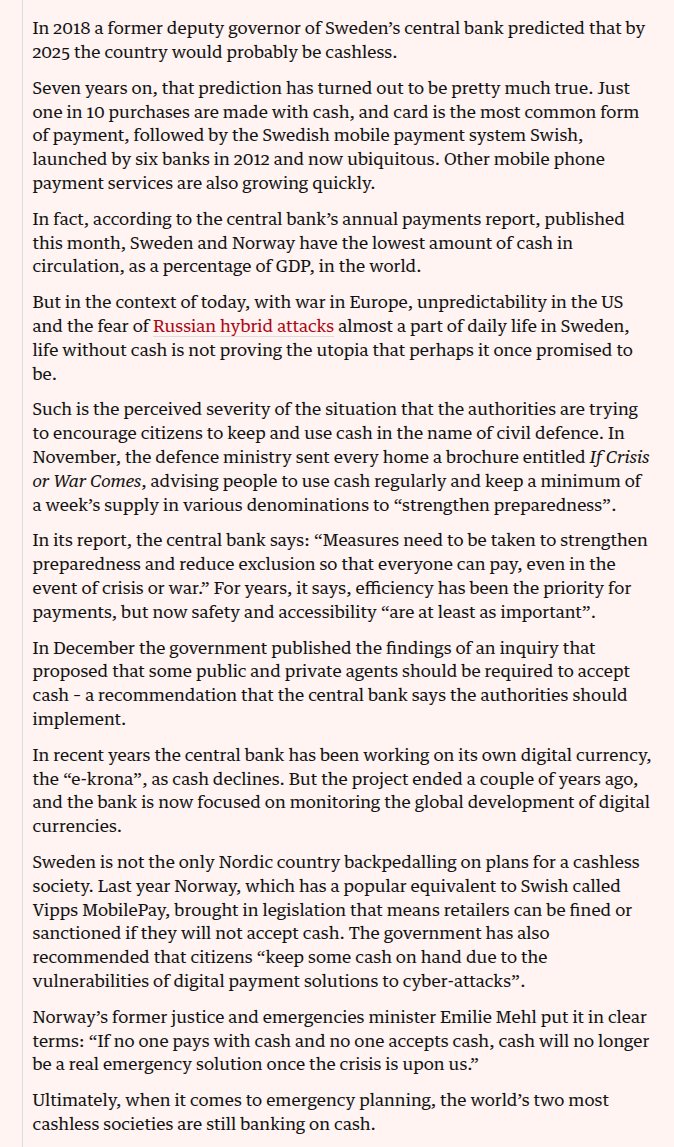Vitalik Buterin: Nordics Abandon Cashless Society Opens Doors for Ethereum
.jpeg)
As Sweden and Norway begin to back away from their cashless ambitions due to infrastructure risks, Ethereum co-founder Vitalik Buterin believes that this could be the time for decentralized systems like Ethereum to prove themselves as flexible alternatives to traditional payment systems.
According to a recent report from The Guardian, two Nordic countries – Sweden and Norway – are starting to require their citizens to maintain cash reserves, marking a reversal in the push for a cashless society that has been strongly promoted in recent years.
On the X platform (formerly Twitter), Vitalik Buterin commented: “The Nordics are backing away from the cashless society initiative because the centralized implementation of the concept is too fragile.” He argues that the reliance on centralized infrastructure makes payment systems vulnerable to failure, especially in the face of growing security threats such as cyberattacks or war.

In fact, Sweden has reduced cash in circulation to just 1% of all transactions, while the Vipps app dominates payments in Norway. However, Russia’s invasion of Ukraine has raised concerns that an attack on the country’s electricity or telecommunications networks could completely disrupt national payments.
“Cash has become necessary as a backup,” Buterin asserts, calling for systems like Ethereum to be developed to be sustainable and private enough to be a reliable alternative in emergency situations.
Is Ethereum a Cash Replacement?
Some experts agree with Buterin’s vision. Sam MacPherson, CEO of Phoenix Labs, a developer of decentralized finance protocols, said that Ethereum is “designed to withstand the most hostile actors” and is currently managing billions of dollars without major issues.
However, there are still many technical hurdles. One of the biggest weaknesses is offline payments – something that traditional cash does perfectly. Ethereum, like most blockchain systems, still relies on electricity and internet connectivity.
Buterin admitted: “We basically know how to do offline payments using zero-knowledge proofs, but it still requires trusted hardware and is still in the testing phase.”
Stablecoins: A Viable Solution?
In addition to Ethereum, experts have also pointed out that stablecoins – cryptocurrencies pegged to the value of fiat currencies like the USD – could be a more suitable solution in connectivity outage scenarios.
“Stablecoins have exploded in usage because they don’t rely on a centralized third party,” said Anthony Anzalone, founder of the XION platform. “Especially in countries with unstable governments or currencies, stablecoins are becoming a popular choice.”
Stablecoins, however, face their own challenges, particularly around privacy and resilience in the event of network infrastructure disruptions.
Ethereum has a long way to go
Harrie Bickle, an expert at the AI platform NodeOps, warned that Ethereum is not yet ready to completely replace cash, especially in crisis scenarios.
“Ethereum still requires users to have access to electricity, a secure operating system, and a Web3 wallet that can’t be hacked, which is difficult to ensure in emergency situations.”
“We need a longer roadmap before Ethereum is resilient enough to replace traditional cash transactions,” Bickle stressed.
Conclusion
The temporary retreat from cashless societies in Sweden and Norway has raised many questions about the future of digital payments. For Vitalik Buterin, this is not only a wake-up call for centralized systems, but also an opportunity for blockchain technology – and Ethereum in particular – to prove its practical value in building a more flexible, decentralized, and secure financial system. However, that journey is still full of challenges.
